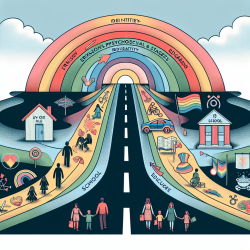The journey of identity development is complex and multifaceted, especially for individuals who navigate multiple intersecting identities. For LGBTQ youth, this journey can be fraught with challenges as they reconcile their sexual orientation with other aspects of their identity, such as ethnicity and cultural background. The research article "Thematic Analysis of My ‘Coming Out’ Experiences Through an Intersectional Lens: An Autoethnographic Study" by Enoch Leung offers valuable insights into this intricate process.
The Limitations of Traditional Developmental Theories
Erikson's stages of psychosocial development have long been a cornerstone in understanding identity formation. However, this framework often falls short when applied to the experiences of LGBTQ individuals, particularly those from ethnic minority backgrounds. Erikson's model emphasizes adolescence as the critical period for identity development, but Leung's research suggests that this process extends into emerging adulthood—a stage not accounted for in traditional theories.
The Role of Intersectionality
Intersectionality is crucial in understanding the unique challenges faced by LGBTQ individuals. It recognizes that identities such as race, gender, and sexuality do not exist independently but interact to shape experiences. Leung's autoethnographic study highlights how these intersecting identities can complicate the journey toward self-acceptance and community belonging.
Key Themes from the Study
- Confusion and Conflict: The initial stages of identity development are marked by confusion as individuals grapple with conflicting aspects of their identity. For LGBTQ youth of color, this often involves reconciling cultural expectations with their sexual orientation.
- The Importance of Supportive Environments: Safe and inclusive spaces are vital for positive identity development. Leung's experiences underscore the need for visible LGBTQ representation and supportive communities to foster self-acceptance.
- The Continuing Journey: Identity exploration does not end with adolescence. Emerging adulthood is a critical period where individuals continue to navigate their intersecting identities and seek acceptance within broader communities.
- External Frustrations: Even after achieving internal acceptance, external factors such as community inclusivity can pose challenges. Leung's study reveals how stereotypes and exclusion within the LGBTQ community can impact mental health and sense of belonging.
Implications for Practitioners
The findings from Leung's study have significant implications for educators and practitioners working with LGBTQ youth. Here are some strategies to consider:
- Create Inclusive Spaces: Schools should strive to be inclusive environments where all students feel safe to explore their identities. This includes visible representation of diverse identities and supportive policies.
- Acknowledge Intersectionality: Recognize that students' experiences are shaped by multiple intersecting identities. Tailor support to address the unique challenges faced by LGBTQ youth of color.
- Foster Open Dialogue: Encourage conversations about identity and inclusivity within educational settings. Provide platforms for students to share their experiences and learn from one another.
- Support Beyond Adolescence: Understand that identity development continues into emerging adulthood. Offer resources and support that extend beyond high school to assist students in navigating this transitional period.
The Path Forward
The journey toward self-acceptance and community belonging is ongoing for many LGBTQ individuals. By embracing an intersectional approach, educators can better support students in navigating the complexities of their identities. As practitioners, it is essential to remain open to learning from research like Leung's and continuously adapt our approaches to meet the evolving needs of our students.
To read the original research paper, please follow this link: Thematic Analysis of My “Coming Out” Experiences Through an Intersectional Lens: An Autoethnographic Study.










